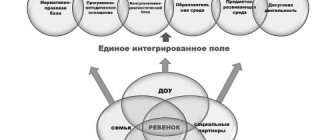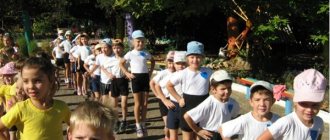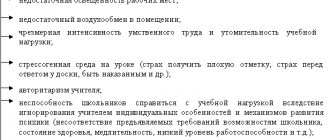Methods and forms of creating continuity at the threshold of the school
With a properly organized smooth transition to school, both parents and children can always count on full information about what awaits them, on qualified help and support from psychologists and teachers.
Possible forms of work with preschoolers:
- excursions to school with visits to the gym, classroom, library, canteen, etc.;
- acquaintance with primary-level teachers and students, joint events, projects with them;
- holding joint sporting events and holidays (first bell holiday, ABC book holiday);
- participation of children in adaptation classes with teachers and primary school specialists;
- preparation of joint theatrical performances and exhibitions of artistic works.
Working with teachers:
- visits by teachers to lessons in the first grade and by teachers to educational activities in preschool educational institutions;
- joint trainings for teachers conducted by a psychologist;
- analysis of diagnostics of psychological readiness for school education of preschool educational institution graduates;
- analysis of the results of adaptation of first-graders to school education;
- holding joint seminars, master classes, round tables.
Interaction with parents of future first-graders:
- open days at school and kindergarten;
- meetings with teachers;
- consultation on current topics by teachers and psychologists;
- joint parent meetings, discussion clubs;
- training course on psychological readiness for school.
If you purposefully engage in the formation of continuity, this will help children show strong-willed efforts, initiative and self-confidence, creativity and a positive attitude towards themselves and their friends when moving to first grade.
How to keep the educational system intact
The basis of the Federal State Educational Standard is teaching a child the ability to independently acquire knowledge. The validity of the activity approach is confirmed by scientific research, which states that any knowledge can lie as a dead weight if the child cannot apply it.
“Tell me and I’ll forget, show me and I’ll understand, let me try and I’ll remember.” The information presented by the teacher should not be perceived passively. Knowledge is not transferred to preschoolers in a ready-made form, but is mastered by them in the process of joint activities with the teacher. This is how cooperation between an adult and a child develops, as well as the communication abilities of children. Preschoolers develop psychological qualities that facilitate mastery of learning activities:
- initiative,
- independence,
- creativity,
- curiosity,
- arbitrariness.
The transition between preschool and the start of school is very difficult. It is not for nothing that so much attention is paid to the adaptation of children in the first grade. The continuity of kindergarten and school helps to make the educational environment a single whole.
The concept of “continuity” means a smooth transition from one educational level to another, preserving the methods and forms of teaching and upbringing. Teachers of the first grades of primary school will not be able to ensure a gentle adaptation of older preschoolers if they are not familiar with the methods of work of the kindergarten preparatory group teacher. If older preschoolers are not familiar with school and have no idea what awaits them beyond the school threshold, it will be very difficult to instill in them a desire to learn.
Understanding the personality traits of educators and teachers is no less important than developing interest in school. For many first-graders, the fact that there must be a certain distance between the student and the teacher becomes a great stress. In a kindergarten, the teacher is emotionally closer to the children; he, as it were, replaces the parents during the child’s stay in the preschool institution. Such differences further complicate the adaptation of first-graders who are accustomed to psychological comfort in relationships with adults.
Objectives of cooperation between teachers of preschool and school education systems:
- development of a unified concept of the process of education and upbringing at school, kindergarten and in the family;
- maximum compliance of the goals and objectives of education at various levels of education, methods of achieving them;
- educating parents on the main psychological and pedagogical areas of child development;
- creating a system of high-quality psychological support for parents to overcome problems during the transition of children to first grade from kindergarten;
- dissemination of family experience of a positive attitude towards the active activities of children in society.
Both school and kindergarten cannot be closed public institutions. Teachers and educators must be well versed in the programs of the preparatory group and the first grade of the school.
Report “Problems of continuity between preschool and primary education”
PROBLEMS OF CONTINUITY BETWEEN PRESCHOOL AND PRIMARY EDUCATION
Batyaeva O. P.,
teacher of MBDOU "Atemarsky kindergarten No. 1 "Teremok",
With. Atemar
School and kindergarten are two adjacent links in the education system.
Success in school education largely depends on the quality of knowledge and skills developed in preschool childhood.
The introduction of the Federal State Educational Standard to the structure of the preschool program and the adoption of new Federal State Educational Standards for primary school education is an important stage in the continuity of kindergarten and school.
The task of the Federal State Educational Standard is to teach children to learn independently
The continuity of preschool and primary education is one of the most difficult and still unresolved problems of general education. For many years it has been discussed among scientists, specialists from educational authorities, teachers, and parents.
In psychological and pedagogical literature, issues of continuity and readiness of a child for school are considered in various aspects. The most general understanding of continuity is interpreted as the relationship between the previous and subsequent educational stages and the preservation of certain features of previous experience in the future. Continuity ensures continuity of development not on the basis of the denial of the old, but on the basis of the synthesis of the most essential of the stages already passed, new components of the present and future in the development of the child.
The pedagogical process is an integral system, therefore, continuity must be carried out in all areas, including goals, content, forms, methods, and be realized through the interaction of all professional levels, including the work of a kindergarten teacher, school teacher, preschool psychologist, kindergarten speech therapist, psychologist schools, etc.
New approaches to the development of continuity between preschool and primary education in modern conditions are reflected in the content of the Concept of Lifelong Education. This document, in my opinion, reveals the prospects for the development of preschool - primary education; for the first time, the continuity between preschool and primary general education is considered at the level of goals, objectives and principles for selecting the content of lifelong education for children of preschool and primary school age; The psychological and pedagogical conditions under which the implementation of lifelong education at these stages of childhood proceeds most effectively are determined. The concept proclaims a rejection of the dictates of the initial stage of school education in relation to preschool education, affirms the individualization and differentiation of education, the creation of an educational and developmental environment where every child feels comfortable and can develop in accordance with his or her age characteristics.
MAGAZINE Preschooler.RF
Continuity between kindergarten and school. Good traditions for the benefit of children.“School learning never begins from scratch, but is always based on a certain stage of development completed by the child . L.S. Vygotsky
The problem of continuity between preschool and primary education is relevant at all times. But a special need for organized activities for the continuity of preschool and primary education has arisen in connection with the modernization of Russian education, namely in connection with the transition to Federal state educational standards in schools and preschool institutions. The Federal State Educational Standard assumes that upon entering the first grade, a preschooler must develop integrative qualities that will create the prerequisites for the formation of universal educational actions of the student. This means that today the school must build its work based on the achievements of the preschooler and organize educational activities taking into account his accumulated experience, because The content of the preschool education program and the use of a subject-spatial developmental environment in preschool classes is aimed at developing those personality qualities that determine the formation of sustainable cognitive interest and successful learning at school. Succession is a two-way process. On the one hand, the preschool stage, which preserves the intrinsic value of preschool childhood, forms the fundamental personal qualities of the child, and most importantly, preserves the “joy of childhood” (N. N. Poddyakov). On the other hand, the school, as a successor, picks up the child’s achievements and develops his accumulated potential.
For a number of years, our kindergarten has been cooperating with the school. Kindergarten teachers at the preschool level, and then primary school teachers at the first stage of education, are faced with the task of early disclosure and formation of students’ interests and abilities for scientific research and project activities. This year, work on the development of project activities has been implemented at a high level in our kindergarten, in which children, parents and teachers take an active part. The use of project activities makes it possible to educate a doer, not a performer, to develop strong-willed personality traits and partnership interaction skills.
Information processes in the education system require a new organization of the system as a whole. Particular importance is attached to preschool upbringing and education. After all, it is during this period that all the fundamental components of the formation of a child’s personality are laid. Forming motivation for the development of a preschooler’s learning, as well as creative cognitive activity, are the main tasks that teachers face today within the framework of the Federal State Educational Standard. These tasks require special learning conditions. In this regard, great importance is assigned to Lego construction in kindergarten. Using educational constructors, children independently acquire knowledge when solving practical problems and problems that require the integration of knowledge from various subject areas. Targeted, systematic teaching of Lego construction to preschool children plays an important role in preparing for school. It contributes to the formation of the skills to learn, achieve results, gain new knowledge about the world around us, and lays the preconditions for the first educational activity. It is important that this work does not end in kindergarten, but continues at school.
At the beginning of the school year, elementary school teachers invite our kindergarten teachers to open lessons. These lessons allow educators to see their students as students and to see the results of their work. Teachers show the results of children’s adaptation to learning at school.
At methodological meetings in kindergarten, teachers got acquainted with the results of federal monitoring of first-graders and discussed the strengths and weaknesses of our activities. We got acquainted with the educational and methodological complex of A.A. Pleshakov ( "School of Russia" ), in which primary school students study in order to decide on the choice of a preschool education program in order to ensure continuity of preschool and primary education.
Continuity between the preschool and school levels of education should not be understood only as preparing children for learning. It is necessary to make the transition of children to school smoother; teachers should carefully become familiar with the forms and methods of work in a preschool institution, and help first-graders quickly adapt to new conditions. For this purpose, this year an adaptation class “School of the Future First-Grader” . Our students, who will go to school in the fall, attend this class every Saturday. Future schoolchildren are given the opportunity to feel like a student today. The children are engaged in productive activities in class, learn to work from bell to bell, get acquainted with the school premises, and visit the school canteen. Such events make a lasting impression on children and dramatically increase school motivation, contribute to children’s acceptance of school culture and contribute to the rapid adaptation of children to school. After visiting school, children in kindergarten share their impressions and strive to express the joy of communicating with school in drawing, modeling, role-playing games, and staging. At the end of April - beginning of May, teachers of the preparatory group of our kindergarten are scheduled to attend such lessons in order to communicate with the future teacher, observe their students, and identify the difficulties that the children face in a new environment for them. It will be important for the teacher to find out a more complete description of each child, his abilities, knowledge, skills, desires, temperament, the family in which the child is being raised, etc. In turn, the teacher will visit our kindergarten, get acquainted with the forms of work in the preparatory group, perhaps give some recommendations to teachers on preparing children for school, observe future students in classes in kindergarten, determine the level of knowledge and skills acquired by children by the end of senior preschool age.
Undoubtedly, parents play an important role in the process of preparing children for school. As part of the succession plan, teachers of the preparatory group held a parent meeting in March, at which the most important issues related to preparing children for school were discussed. For parents of future first-graders, a parent meeting was organized and held at school.
A system of cooperation with elementary schools has developed in terms of holding joint events. Every year, a joint socially significant project “Graduate Day” with the aim of organizing children's communication. This has become a kindergarten tradition. The project includes a tour of the kindergarten “What has changed in the kindergarten?” ; interviewing first-graders “Memories of kindergarten” and preschoolers “Do you want to go to school and why?” .
Within the framework of the project, intellectual competitions “KVN” , “What? Where? When? or sports competitions for preparatory group and first-graders - former kindergarten graduates. All events necessarily include musical and rhythmic activities.
In our methodological collection there are many events organized for the purpose of children's communication, the development of children's communication skills, the ability to act in a team, communication with adults and peers: the intellectual game “What? Where? When?" , KVN “Fairytale Kaleidoscope” , sporting events “Fun Starts” , “Zoological Races” , “King of the Hill” , Health Day dedicated to the 20th anniversary of the Kolobok .
Also, every year kindergarten teachers are invited to school events “First Bell” , “Farewell to School!” . For a number of years, educators have been monitoring the successes of their students at school and at the last bell, holding back tears, they wish the almost adult children not to be afraid to enter adulthood, to be worthy citizens of their Motherland.
School teachers always attend the graduation party in kindergarten, where the head of the kindergarten “entrusts” the graduates to the teacher for their further education and development, and the teacher says parting words to future students, wishes them to gain health in the summer, and expresses a desire to see them at school as soon as possible.
In the fall, at the school, every year since 2009, our teachers participate in joint pedagogical conferences, at which the most pressing issues relating to the education and development of children, their safety and health are discussed. Teachers share their work experience and develop recommendations.
Twice on the professional holiday Teacher's Day, teachers from all educational organizations in the village were awarded Gratitude and Certificates in a solemn atmosphere at school, followed by a concert from schoolchildren. I would like to continue this good tradition and include it in the plan of joint activities.
However, our work also has its shortcomings. Although jointly planned activities are generally carried out, in recent years succession plans have been drawn up unilaterally. This is influenced by various reasons: lack of time for meetings, unfavorable weather conditions, children falling ill, closure of institutions for quarantine, etc. If it is not possible to hold a joint event on time, holding it later is often impractical.
In conclusion, I would like to say that only the interest of both parties and the parent community will allow us to truly solve the problems of continuity of preschool and primary education, and make the transition from kindergarten to primary school painless and successful.
| Next > |



